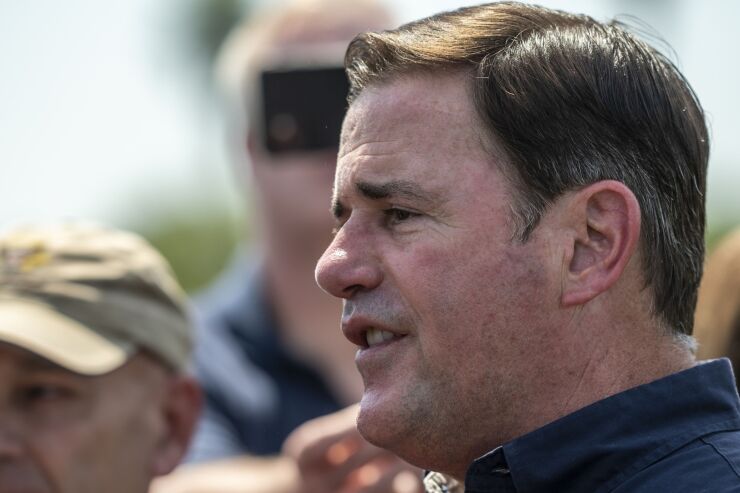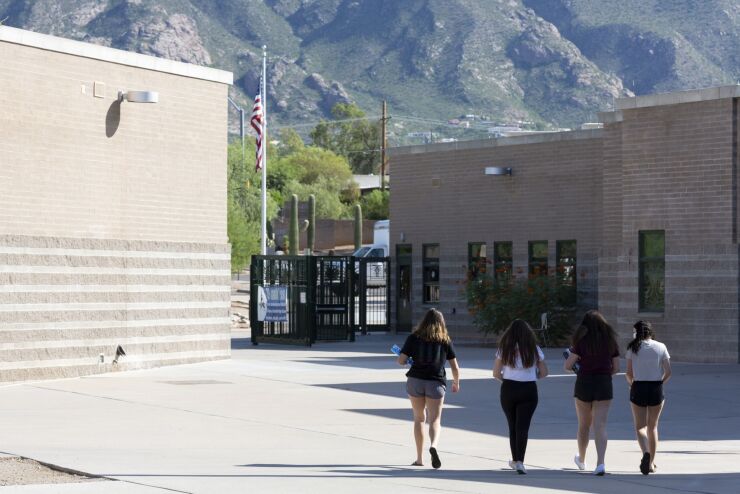Arizona is blazing a new trail in the school choice movement by expanding a state-funded program to allow all parents to choose where their children are educated.
The impact on public school finances is uncertain as the law signed July 7 by Gov. Doug Ducey could face a voter referendum and no one knows just how many students will migrate to private, religious, or home-based schools.
“It’s still somewhat speculative about how many students will start changing over,” said Chuck Essigs, director of government relations at the Arizona Association of School Business Officials. “It’s kind of a guess because we’ve never had universal vouchers in Arizona and no other state has had universal vouchers."

Ducey, a Republican, hailed the enactment of the most expansive school choice law in the nation as “a monumental moment for all of Arizona’s students.” About $7,000 per student per school year will be available to parents for private school tuition, online curriculum, and educational supplies when the law is expected to take effect Sept. 24.
Save Our Schools Arizona, an organization that advocates for public schools and public school funding,
A
“We consider these estimates to be highly speculative, as the participation rate among currently ineligible pupils is difficult to know in advance,” the report said, adding that some private school parents could continue to opt for scholarships through an existing school tuition tax credit program.
It also said that basic state aid payments to publicly funded school districts and charter schools would be reduced as a result of estimated shifts in enrollment to private schools.
Before the passage of House Bill 2853 by the Republican-controlled legislature, empowerment scholarship accounts were limited to students with special needs, wards of the courts, those residing on a Native American reservation, or attending a failing public school.
Eligibility also included children of active or killed-in-the-line-of-duty military parents. As of the third quarter of fiscal 2022, the program had 11,775 active students, according to the Arizona Department of Education. The budget committee report pointed to data showing about 38,000 homeschooled children and 59,171 private school students in Arizona.
Akheil Singla, an assistant professor at Arizona State University’s School of Public Affairs, said a funding boost in Arizona’s fiscal 2023 budget could cushion the immediate impact of the law on public school finances.
Lawmakers increased K-12 funding by $1 billion to total $8.45 billion, with $329 million earmarked to raise the base support level of education spending, representing the single largest dollar and percentage increase in per pupil funding in 20 years, according to a statement from Ducey’s office.
If demand for the vouchers is much higher than anticipated, there could be negative financial ramifications for public schools, Singla said.
“From an issuer perspective or from an investor perspective, there is uncertainty here,” he said, adding that he doesn’t anticipate the law causing “massive fiscal harm to existing public schools.”
Over the longer term, Singla said the law may be a kind of “canary in the coal mine” in terms of where Arizona’s education money might flow in the future.
Jessica Wood, an S&P Global Ratings analyst, said the rating agency will be looking at changes in enrollment to see how public schools are faring.
“There will be more competition for students,” she said. “In certain areas where there is already competition, that will be more challenging.”
The COVID-19 pandemic spurred student movement out of traditional public schools to publicly funded charter schools, which generally were able to pivot more quickly to remote learning and reopen faster, according to Wood.
More than 1.1 million students attend publicly funded K-12 schools in Arizona, with 237,000 enrolled in charter schools. At 18%, Arizona has the highest percentage among states of public school students enrolled in charter schools.
Whether the law will take effect this fall is up in the air.
Save Our Schools launched a drive to collect 118,823 valid signatures by Sept. 24 to force a statewide vote on the law. If the petition drive is successful, the law would be put on hold until the November 2024 election, although supporters of the law said a vote could take place as soon as this November.
The group noted that a previous voucher expansion law put on the ballot in 2018 was overwhelmingly rejected by voters.
Steve Smith, Arizona state director with the American Federation for Children, a school choice advocacy group, said his organization opposed the previous “flawed” expansion law, which would have made all students eligible to apply for ESAs, but capped participation at around 30,000 students.
With no cap, Smith said there is much more support for the new law and parents are more open to ESAs given impact the pandemic had on public schools.
He pointed out that while tuition at about half of Arizona’s more than 500 private schools is at or below $7,000, it was difficult to project how many new students would take advantage of the expanded program.
“If you love that public school, stay there. We want you to stay where you will be most successful. And the majority of the kids will,” Smith said. “But for the smaller majority that just needs a different outlet, why can’t you be happy for that child? Why doesn’t it work both ways?”
The JBLC report included an assumption that private schools would have short-term capacity constraints that would limit annual enrollment growth from new ESA students to 5%.
Geoffrey Brown, superintendent of Northwest Christian School, the largest single-location private school in Arizona, said he does not anticipate in-person enrollment increasing.
“I do anticipate that our online school will continue to grow,” he said in an emailed response to questions. “Will this anticipated growth be because of universal ESA's? Again, that is hard to determine.”
In 2020, the school sold nearly $7.4 million of Ba2-rated revenue bonds through the Industrial Development Authority of the City of Phoenix to refund existing debt related in part to replacing a classroom building.

Brown said the school board wants to reduce and eliminate debt so he doesn’t anticipate issuing any new debt if enrollment demand increased under the new law.
Religious-based education
Other states could also opt to fund expanded choices for students.
Victor Riches, president and CEO of the Phoenix-based conservative Goldwater Institute,





